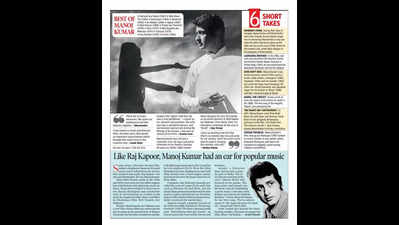Man who made ‘Bharat’ a screen hero – The Times of India

Manoj Kumar, who constructed and embodied Hindi cinema‘s ultimate nation-loving hero, Bharat, in blockbusters such as ‘Upkar’ (1967), ‘Roti Kapada Aur Makaan’ (1974) and ‘Kranti’ (1981), passed away early Friday. He was 87. The actor was bedridden for the last few years battling health issues, his son Kunal Goswami told PTI. He was admitted to hospital for pneumonia some weeks ago.
A recipient of the Dadasaheb Phalke award in 2016, Kumar also starred in a bunch of stylish whodunits, notably ‘Woh Kaun Thi’ (1964) and ‘Gumnam’ (1965) and successful crime dramas such as ‘Sanyasi’ (1975) and ‘Dus Numbri (1976)’. But it was Bharat — the screen name he often took in the films he produced and directed — that defined his image.
Bharat’s idea of patriotism evolved over time. He was a nation builder in ‘Upkar’ ploughing the fields, battling the enemy outside and personifying Prime Minister Lal Bahadur Shastri’s slogan, ‘Jai Jawan, Jai Kisan’. In ‘Purab Aur Pachhim’ (1970), he was a cultural nationalist defending ‘Bharatiya sanskriti’ from the ‘polluting’ West while insisting that sari is better than skirt. Bharat rarely touched his heroine even though the movies weren’t exactly shy in displaying the female anatomy.
Manoj Kumar constructed Hindi cinema’s ultimate nation-loving hero, Bharat— the screen name he often took in the films he produced and directed.
In the 1970s when corruption and joblessness took centre-stage, the unemployed Bharat took on the enemy within, the black marketeers, in ‘Roti Kapada Aur Makaan’ (1974), a film that started the multi-starrer trend in Hindi cinema. And in ‘Kranti’, he time-travelled to the 19th century to fight brutish colonial masters.
Over the decades, the name, Bharat, blended Kumar’s celluloid and private identities, looming large in public consciousness. “Is naam ka bahut bojh hai mujhpe. Zaroorat se zyada zimmedariyan dalta hai (The name burdens me. It puts added pressure and responsibility),” he once said in an interview.
Kumar’s personal life was remarkably free from the controversies that gossip mags hungrily fed on in the 1970s and 1980s.
Born in 1937 in Abbottabad, a town in north Pakistan, Kumar lost his uncle to Partition violence. At 10, he arrived in the capital, growing up in the refugee colonies of Kingsway Camp and Hudson Line in Delhi. His infant brother, Kuku, too died in the same period. “Bahut rota hua bachpan tha (I had a very sad childhood),” he said in Guftagoo, a Rajya Sabha TV show.
Recalling a moment in Delhi’s Tis Hazari hospital during the Partition riots, he said, “When the sirens blared, the doctors and nurses would take shelter in the basement. My mother screamed. Kuku had died. I was angry. I took a lathi, beat up doctors and nurses. Later we immersed him in the Yamuna. As the body sank, I felt I was sinking. My father made me promise that night I will never fight again.” The boy kept his word. His father was a poet who was given the pen name “khizr” (the knowledgeable) by eminent poet Allama Iqbal, he said.
Kumar got interested in movies after watching Dilip Kumar in ‘Jugnu’ (1947). He even took his celluloid name, Manoj Kumar, after the character played by Dilip Kumar in ‘Shabnam’ (1949), an actor who was to influence his style. His real name was Harikrishan Goswami.
A graduate from Delhi’s Hindu College, Kumar arrived in Bombay in 1956. In TV shows, he recounted facing abuse, sleeping on railway platforms and getting beaten by cops before making his debut in a small role in director and relative Lekhraj Bhakri’s ‘Fashion’ (1957). He made his leading man debut in HS Rawail’s ‘Kaanch Ki Gudiya’ (1961) and survived a series of flops before striking gold in Vijay Bhatt’s social drama, ‘Hariyali aur Raasta’ (1962).
Tall, fair and handsome, Kumar became a reliable box-office brand, delivering hits such as ‘Himalaya Ki God Mein’ (1965), ‘Sawan Ki Ghata’ (1966) and ‘Neel Kamal’ (1968), a reincarnation yarn. The engagement with nationalism started with ‘Shaheed’ (1965), where he played revolutionary Bhagat Singh. The film received National Award for Best Feature film in Hindi. Made at the request of then PM Shastri, his directorial debut ‘Upkar’ (1967), partly shot in a village on the outskirts of Delhi, became a super hit. No song encapsulates rural India’s idealised image better than lyricist Gulshan Bawra’s ‘Mere desh ki dharti…’
As Kumar’s career progressed, he developed a drawl for dialogue delivery; a signature hand movement across the face became more pronounced. Critics scoffed at the mannerisms but fans didn’t mind. He also graduated to writing, editing, producing and directing his movies. In the 1980s, he even wrote songs, making him an accomplished all-round talent.
Manoj Kumar’s multi-starrer historical ‘Kranti’ (1981) was his biggest box-office hit. But thereafter the winners dried up. His final appearance as a leading man was in the vastly outdated ‘Clerk’ (1989) which showcased Pakistani stars, the Rampur-born Mohammad Ali and Zeba Ali.
Kumar was married to Shashi, whose mother Savita Behen was a Congress politician of Delhi, who was nominated to Rajya Sabha, recalls Vivek Shukla, a chronicler of the capital. Initially a Congress supporter, Kumar joined the BJP in 2004.
His death on Friday was mourned widely. “He was an icon of Indian cinema, who was particularly remembered for his patriotic zeal, which was also reflected in his films. Manoj-ji’s works ignited a spirit of national pride and will continue to inspire generations,” posted Prime Minister Narendra Modi on X.
















